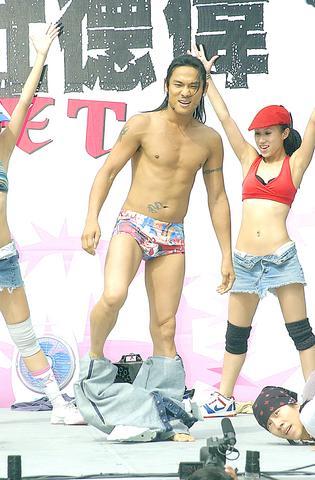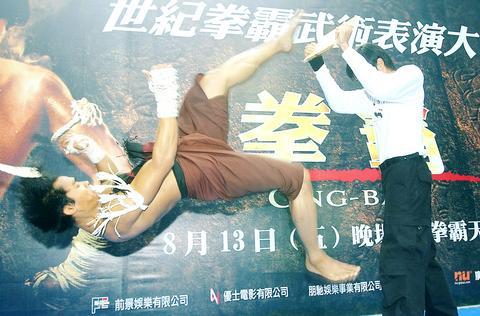It's natural with the hot weather to shed inhibitions and clothing. Singer Alex To (杜德偉) and his fans are no
exception.
For his latest album Take Off (脫掉), To not only makes a nude appearance in his music video, but he also invited his fans to do the same. On Sunday in a promotion for his new musical offering. To stripped to his shorts in Ximending. His record company advertised "half naked for half price, all naked for free" CDs, to encourage people to go on stage and strip with To. A few women took off their tops and presumably got half price CDs.

PHOTO: TAIPEI TIMES
"I look at myself in the mirror every night, naked, and make believe I'm 25. I can dance, sing, act, write songs and I'm good-looking!" said To (actual age, 42), adding he's proud of his iron-hard hard butt. According to The Great Daily News (大成報), however, To didn't just lose his clothes last week, he also lost his wallet and work permit in a taxi, causing a headache for his manager.
Thai action star Tony Jaa was another hot male body in action last weekend. In a promotion for his movie Ong Bak, Jaa gave Taiwanese reporters a first glimpse of his awesome Thai martial art powers. He somersaulted into the press conference and then practiced "kicks" at a 2m-tall colleague. It was all done so quickly the photographers present had to ask him to do it again, and again.
"I don't smoke, drink or have sex. I don't touch anything that's bad for the body. The most important thing for me is Thai boxing," the 28 year-old actor said. "The sacrifice is worth it." Whatever, Jaa is now back in Thailand to shoot the mega-budgetedTom Yum Goong, a story about saving an elephant from being abducted.

PHOTO: TAIPEI TIMES
Jackie Chan's (成龍) 22 year-old son Jaycee Chan (房祖明) is receiving recognition for his singing skills and dad will doubtless be chuffed. At the 6th CCTV-MTV Music Award Ceremony held last Saturday in Beijing, Chan Jr. took the award for Best Hong Kong New Performer. Never mind the fact that his record has not been released yet, and few people in China (let alone Taiwan)) have ever heard of his singing. Dad has clout, obviously. Jaycee Chan is also starring in the NT$320 million action thriller, Twins Effect II (千機變II花都大戰), in which his father is an investor.
"I don't want to rely on my father's connections in the entertainment field. In fact, I don't want people to mention his name in front of me," Chan was quoted as saying by Chinese media. Yeah, right.
In its second week of release, the negative reception to House of Flying Daggers (十面埋伏) is becoming a chorus of disapproval in the media and in Internet chatrooms in China, Hong Kong and Taiwan. In Beijing, film professor Su Mu (蘇牧) wrote an article slamming the film as "childish and ridiculous."
"Most of the audience was laughing in the theater and this expressed the contempt of the audience toward Chinese filmmakers," Su wrote. In Hong Kong well-known actor and director Michael Hui (許冠文) told Apple Daily (蘋果日報) that only one word could describe the movie ? "crap." In Taiwan, a movie Web site concluded, "Basically you can treat this movie as a comedy and laugh about it. But then again, NT$250 is better spent on more meaningful things."

Towering high above Taiwan’s capital city at 508 meters, Taipei 101 dominates the skyline. The earthquake-proof skyscraper of steel and glass has captured the imagination of professional rock climber Alex Honnold for more than a decade. Tomorrow morning, he will climb it in his signature free solo style — without ropes or protective equipment. And Netflix will broadcast it — live. The event’s announcement has drawn both excitement and trepidation, as well as some concerns over the ethical implications of attempting such a high-risk endeavor on live broadcast. Many have questioned Honnold’s desire to continues his free-solo climbs now that he’s a

As Taiwan’s second most populous city, Taichung looms large in the electoral map. Taiwanese political commentators describe it — along with neighboring Changhua County — as Taiwan’s “swing states” (搖擺州), which is a curious direct borrowing from American election terminology. In the early post-Martial Law era, Taichung was referred to as a “desert of democracy” because while the Democratic Progressive Party (DPP) was winning elections in the north and south, Taichung remained staunchly loyal to the Chinese Nationalist Party (KMT). That changed over time, but in both Changhua and Taichung, the DPP still suffers from a “one-term curse,” with the

Jan. 26 to Feb. 1 Nearly 90 years after it was last recorded, the Basay language was taught in a classroom for the first time in September last year. Over the following three months, students learned its sounds along with the customs and folktales of the Ketagalan people, who once spoke it across northern Taiwan. Although each Ketagalan settlement had its own language, Basay functioned as a common trade language. By the late 19th century, it had largely fallen out of daily use as speakers shifted to Hoklo (commonly known as Taiwanese), surviving only in fragments remembered by the elderly. In

William Liu (劉家君) moved to Kaohsiung from Nantou to live with his boyfriend Reg Hong (洪嘉佑). “In Nantou, people do not support gay rights at all and never even talk about it. Living here made me optimistic and made me realize how much I can express myself,” Liu tells the Taipei Times. Hong and his friend Cony Hsieh (謝昀希) are both active in several LGBT groups and organizations in Kaohsiung. They were among the people behind the city’s 16th Pride event in November last year, which gathered over 35,000 people. Along with others, they clearly see Kaohsiung as the nexus of LGBT rights.